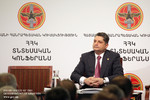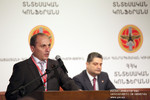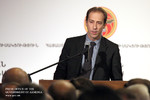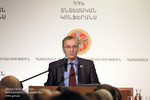Sunday, 30 October 2011
RPA First Economic Forum Kicks Off
This morning, the Republican Party of Armenia started its first economic conference in Yerevan.
The economic forum was opened by President Serzh Sargsyan’s message which was presented Chief Economic Adviser to the President Aram Gharibian.
Welcoming the conference participants, the Prime Minister stated in part: “Developing and conducting the first economic conference, Republican Party of Armenia, seeks to brief party members, colleagues and society on the country’s economic situation, which is first of all the Party’s responsibility by virtue of the votes received from the citizens of the Republic of Armenia. Armenia's economic policy is implemented by the coalition government led by three fundamental documents: the 2008 electoral program of Republican candidate Serzh Sargsyan, the memorandum signed by the political coalition in 2008 and the Government’s 2008-2012 program.
Playing a key role in the coalition government, the Republican Party of Armenia is guided by the principles of human rights and fundamental freedoms of the Charter and the Constitution of the Republic of Armenia. Abiding by the principles of transparency and accountability, our party members, government ministers responsible for industry and our supporters will present the activities of the coalition government of 2008-2011.
In his message, the President of Armenia states that the document submitted to you should be put up for public discussion: I think that this conference is a unique opportunity for us to present the outcome of government activities in the regions and communities, to initiate discussions on topical issues in a bid to raise the needed proposals and recommendations with a view to formulating the economic issues of our electoral program.” (Prime Minister Tigran Sargsyan’s statement is available separately on the website).
Speeches were made by European People’s Party (EPP) representative Nicolas Bruke and “United Russia” party member, RF State Duma member Igor Chernishenko.
In particular, Nicolas Bryuke in his speech noted that the EPP fully supports the government’s bold reforms, adding that only through challenging reforms implemented in the spheres of human rights and the fight against corruption the government can guarantee the independence and sovereignty of Armenia: “The EPP will use its long experience to assist the authorities of Armenia and the Republican Party with this process. Bilateral cooperation will go strengthening and you will see its evidence in future,” the EPP representative said.
According to Mr. Bryuki the European Union and Armenia boast common heritage and shared values, and their co-operation is fully supported by the EPP. He advised that the President and the Prime Minister of Armenia will be invited to attend the EPP congress due this December in Marseilles.
“United Russia” party member, RF State Duma member Igor Chernishenko stressed in his speech that the Armenian-Russian relations are deeply rooted in history and have an important role to play both in the region and in the world. He emphasized that the high-level of bilateral relations was reaffirmed during President Serzh Sargsyan’s State visit to the Russian Federation.
According to Mr. Chernishenko, the economic component is central in the Armenian-Russian relations which is translated in the joint efforts aimed at overcoming the economic crisis: “The Armenian-Russian economic relations are developing dynamically,” he said, adding that the bilateral ties are focusing on cooperation in the energy sector, information technologies and many other areas. Mr. Chernishenko also referred to the two countries’ political relations. In this context, he emphasized that the problem should be solved within the framework of the OSCE Minsk Group, taking into account the opinion of the people.
A number of key issues will be discussed on the sidelines of the about day-long economic forum. The discussions will highlight the following topics: “Industry and Agriculture: developments in the real sector of the economy,” “Infrastructure projects and harmonious territorial development,” “Business environment and public administration reform,” “Human resource development and social integration.”











